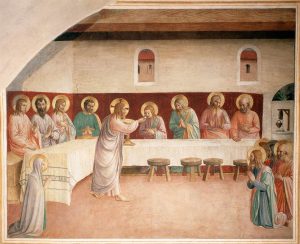HOMILY CORPUS CHRISTI SUNDAY
Celebrating God’s Love
(Deuteronomy 8:2-3, 14-16; Psalm 147; 1 Cor 10:16-17; Jn 6:51-59)
*****************************************************************
What is the world’s oldest religion?
There are some who suggest it is cannibalism and human sacrifice. That spirituality is based on the primal need to have power and control over spiritual forces and the forces of nature. Fear is a big part of that kind of religion.
God’s way of dealing with this age-old curse is the life, death and resurrection of Jesus leading to a Eucharistic spirituality based on love. That is the spirituality we celebrate today with this feast of the Body and Blood of Jesus, or Corpus Christi.
The Hebrew people in Egypt were surrounded by a pagan society that believed in many gods, and that bordered on treating the Pharoah as another god. One characteristic of paganism is a focus on the here and now, rather than on the after-life. The role of prayer and ritual was largely to please and placate the gods who were largely malevolent so that they would not interfere with one’s daily lives in this world. There was a natural tendency to human sacrifice as the most pleasing gift to the gods that would assure a good life for the practitioner. Fear was often the driving motive behind this kind of religiosity and piety.
The liberation of the Hebrew people from Egypt through the sacrifice of a lamb, the gift of the Law, a new way of life on Mt. Sinai, and the forty years journey in the wilderness mark a liminal space, a major transition to a new understanding of how to relate to God, a transition from fear to faith and love,
The central, most powerful and mystical symbol of that new way of relating to God, is the Eucharist. Elements of the Eucharist are woven into the historical narrative of the Chosen people, from Egypt, to Mt. Sinai, to the desert wanderings.
First, the Paschal meal of a sacrificial lamb and the blood of that lamb on the doorposts of the Hebrews brought them liberation from Egypt. Then the Word of God, the Law of Moses, was given to the people on Mt. Sinai. There, the sacrifice of bulls whose blood was sprinkled on the people and on the altar sealed a new covenant with God. There is even a brief, brilliant passage in Exodus where the elders and Moses gather on the mountain, and eat and drink with God.
In the desert wandering, the people learn some important lessons. They learn first of all to trust God one day at a time. God would give them manna in the morning, and quail in the evening, and they were not to save any for the following day. God also provided them with water from a rock, symbolizing Christ.

Fra Angelico
God also saved them from poisonous scorpions, not by taking the scorpions away, but by having the people gaze upon a bronze serpent raised on a standard, that had no poison within it. What a powerful symbol presaging the saviour hanging on the cross, who had no sin, no addiction in him. That set the stage for the Last Supper where Jesus, with his disciples, acted out the meaning of what he would be doing the next day on the cross, offering his body and blood as a perfect sacrifice to the Father for our liberation and holiness. All this history hinges on eating and drinking, food and drink, the basic Eucharistic elements.
As God journeyed with the people in the desert and was present to them, Jesus even more so is present to us today in the Eucharist. In the Gospel when Jesus speaks of eating his flesh, he uses the word sarx rather than soma. Soma has the meaning of the body beautiful, at its best. Sarx refers to the body with its limitations, a body that grows old, gets sick, gets wrinkles, sags and is a challenge at times. One way to put this is that God accepts us as we are, but believes in who we can become.
At its deepest level, then, the Eucharist makes present to us the unconditional love of God in Jesus shown to us on the cross, given to us to empower us to love one another as Christ has loved us. That means understanding, forgiveness, being compassionate, caring – in short, unconditional love. We are to love each other with all our imperfections and limitations, empowered by the Eucharist, just as God in Jesus has loved us, at the Last Supper and on the Cross the next day.
After the closing prayer during the final mass at an Oblate mission in Wahti in the Northwest Territories, a band member stood up and shared how he had hurt the community by his selfish political actions, and apologized to the community. The chief responded by accepting the apology on behalf of the community, and promised that as chief and council, they would try to improve their own leadership on behalf of the community. The two men then hugged each other. Everyone present was moved by this scene, and realized that they were seeing the Eucharist that they had just celebrated being lived out as Jesus meant it to be lived out.
The Eucharist also invites us into an intimate relationship with God and with Jesus, through his Word that enters our hearts and through communion with the Real Presence of Jesus in the Eucharist itself. We are to abide in Jesus, and he in us.
So, as we celebrate this Eucharist, and the feast of the Body and Blood of Jesus, let us once again soak up God’s love for us, and strive to live out the Eucharist in our lives through our unconditional love for all others.



